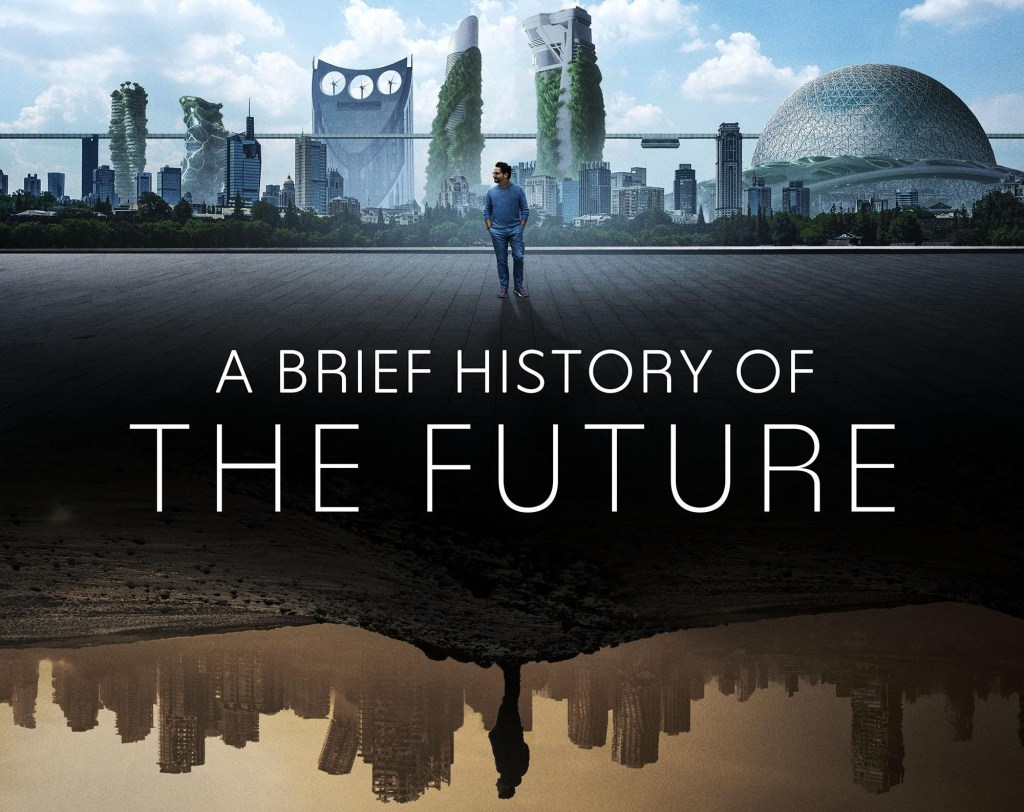Cynicism is a quality taken almost for granted in tech journalism, and certainly we are as guilty as the next publication. But both the risk and the promise of technology are real, and a new documentary series tries to emphasize the latter while not discounting the former. “A Brief History of the Future,” hosted by Ari Wallach, also has the compelling quality of, as a PBS production, being completely free.
The thesis of the show is simply that, while the dangers and disappointments of technology (often due to its subversion by business interests) are worth considering and documenting, the other side of the coin also should be highlighted not out of naiveté but because it is genuinely important and compelling.
I talked with Wallach, who embraces the “futurist” moniker unapologetically from the start, suggesting we run the risk of blinding ourselves to the transformative potential of tech, startups and innovation. (Full disclosure: I met Ari many, many years ago when he was going to Berkeley with my brother, though this is quite coincidental.)
“The theory of the case is that when you ask 10 Americans ‘what do you think about the future?’ nine out of 10 are gonna say, I’m afraid of it, or they’re going say it’s all about technology. Those are two things that this show in some ways is an intervention for,” explained Wallach.
The future, he said, isn’t just what a Silicon Valley publicist tells you, or what “Big Dystopia” warns you of, or even what a TechCrunch writer predicts.
In the six-episode series, he talks with dozens of individuals, companies and communities about how they’re working to improve and secure a future they may never see. From mushroom leather to ocean cleanup to death doulas, Wallach finds people who see the same scary future we do but are choosing to do something about it, even if that thing seems hopelessly small or naïve.
“We wanted to bring the future into people’s living rooms that don’t normally think about it in a critical, open-minded way, in terms of the futures that you create,” he said. “People just don’t get exposed to it. Because at the current moment, there are a whole host of reasons that, culturally, to be critical and cynical is to come across as smart and aware. But now we’re at a point that if we continually do that, we’re going to lose the thread. We’re going to lose the narrative of the entire larger human project.”
The point, in other words, isn’t to pretend the problems don’t exist, but rather that there are enough people talking about the problems already. Shouldn’t someone focus on what people are actually doing to solve them?
Of course the expected themes of AI, automation and climate are there, but also food, art and architecture, and more philosophical concerns like governance and value.
The most common objection my cynical mind raised while watching was the classic “how does this scale?” And Wallach was quick to admit that much of it doesn’t.
“How does it scale, and how do you monetize it — this is kind of the Silicon Valley-ization, the Sand Hill Road of looking at the future. And there’s a time and a place for that! It may go forward, it may not. That’s not the point. We tried to inform and educate around how to think differently about tomorrow, and here are examples of people doing it. It’s a model behavior and action to give people a sense of agency. Like, are we all going to live in 3D-printed homes? Maybe not. But if we think about the 2-3 billion unhoused people on the planet and how we’re going to house them, this is potentially going to be a part of it,” he continued.
“It’s about solution centricity that isn’t purely VC solution centricity. It’s about, how do we solve the problems that we have today through an opportunity lens, as opposed to a ‘we’re all gonna die’ lens, which is usually what the headlines are, right?”
Wallach’s thesis earned his crew a golden ticket to travel the world and talk with numerous interesting people and companies. Vertical farms, mushroom leather, coral propagation. Pete Buttigieg, Emmanuel Macron, Reid Hoffman, Grimes, footballer Kylian Mbappé. And everyone seems to be relieved to be able to talk about the promise of the future rather than the threat of it.
When I asked Wallach where or with whom he’d have liked to have spent a bit more time, he gave three answers. One, a professor in northern Japan who has a theatrical, but apparently quite effective, way of asking seniors to consider the future, by having them pretend they are visiting from it. Two, Lawrence Livermore National Lab, where the level of innovation and ambition was, he said, too high to express. And three, the “death doula” who helps people move past the anxiety of their own existence ending. (Although technology is often discussed, it’s far from the only topic.)

In case you’re wondering what moneyed special interest is trying to placate you with this beneficent presentation of a kindlier, wiser future… don’t worry, I asked. And the shadowy corporation behind this remarkably well-produced documentary is none other than the nefarious Public Broadcasting Service. Which means, as noted above, that it is not only free to stream on PBS.org, and on YouTube (I’ll add the first episode below as soon as it’s live), but it will also appear on normal, linear TV every Wednesday at 9 p.m. — “right after Nova.”
The general audience at which a show like this is aimed, Wallach reminded me, isn’t engaging on TikTok or often even streaming services. Millions, especially older folks who are not yet embittered to the promise of the future, turn on the TV after dinner to watch the local news, a network show and maybe a documentary like this one.
Wallach and his crew have also put together a classroom-specific version of the show that includes educational materials for following up with students about the topics covered.
“This will be the first nationwide futuring curriculum put into being, available to over 1.5 million teachers on the PBS education platform. That’s like 20 million kids. It’s cool. And it’s free.”
As a parting thought, Wallach noted the shows he grew up with, and how it’s “peak job” to be able to make something in emulation — though he was careful not to compare his to them — of classic shows like Cosmos, The Power of Myth and Connections.
“Cosmos changed how I think about the universe; The Power of Myth, how I think about faith, meaning, psychology; hopefully, A Brief History of the Future changes how folks think about futures and tomorrow. That’s the company that we wanted to be in.”































Comment